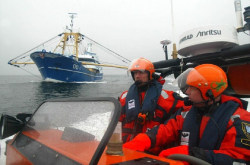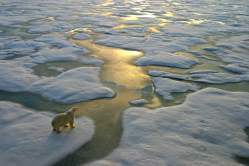The issues
Our oceans are a key source of food and employment for millions of us around the world, but fish stocks are being depleted, making fish a valuable commodity. Organized, transnational criminal groups are increasingly turning to illegal fishing, which is threatening food security, and the economic, social and political stability of coastal nations.
The illegal activity does not stop at fishing - criminals use fishing vessels to traffic drugs and people, because their nomadic navigation patterns and long periods at sea make it easy for these vessels to blend into the maritime background without suspicion. Criminal networks also use the proceeds of large-scale commercial fishing to finance other illegal activities.

Our response
The INTERPOL Environmental Security Sub-Directorate assists agencies in our member countries to detect, suppress and combat fisheries crime. We work to ensure the traceability and legality of fish along all points of the supply chain, and conduct operations to stop the networks responsible for these crimes in their tracks.
We assess the needs of law enforcement in vulnerable member countries and provide tools and support to ensure they can disrupt trafficking routes and enforce national legislation.
We work to enhance cooperation and innovation to prevent and fight fisheries-related crime. We work with our member countries along all points of the fisheries supply chain, both on shore and at sea, to raise awareness about the impact that illegal, unreported and unregulated (IUU) fishing and associated crimes can have. Our intelligence officers support member countries to identify and disrupt criminal networks, not individual artisanal fishermen.

We have assisted countries to detain illegal fishing vessels, prosecute members of criminal groups and uncover associated crimes that take place within the fisheries sector.
Recent and ongoing initiatives
Project ALIOS
Supported by the European Commission's Directorate-General for Maritime Affairs and Fisheries, Project ALIOS is an INTERPOL initiative aimed at promoting sustainable ocean management through international law enforcement cooperation, with a specific focus on combating IUU (Illegal, Unreported, and Unregulated) fishing.
Project GAIA
Within the framework of the project Fighting Climate Change and Loss of Biodiversity, otherwise known as Project GAIA, supported by the German Federal Ministry for the Environment, Climate Action, Nature Conservation and Nuclear Safety; INTERPOL is providing mentoring and capacity building to member countries to strengthen law enforcement capabilities to detect and investigate fisheries-related crimes.
The work conducted also promotes increased criminal intelligence collection and exchange, supporting member countries to enhance their transnational investigations and dismantle organised criminal networks operating across borders.






